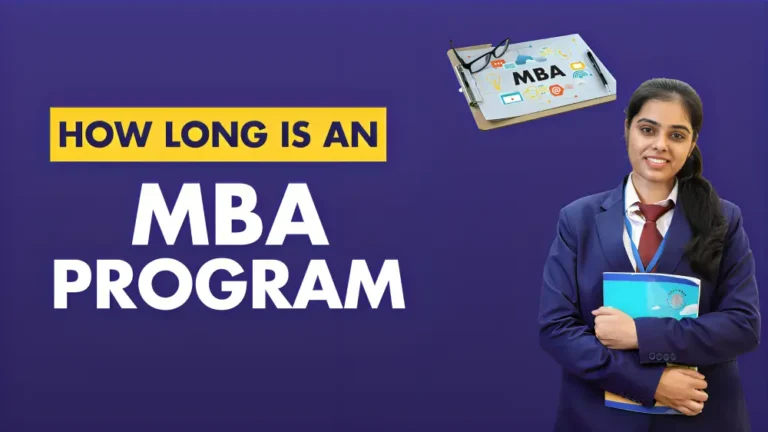MBA in HR: A Comprehensive Guide to a Promising Career
An MBA in Human Resources (HR) is often pursued by those with an interest in people management, organizational development, and creating a positive work culture. For those who have a strong interest in strategic workforce planning, leadership, and teamwork, this specialty is perfect. This article includes everything you need to know to get an MBA in HR, from the program’s advantages to employment options.
MBA in HR Overview
| MBA HR Full Form | Master of Business Administration in Human Resources |
| Course Level | PG |
| Course Duration | 2 Years |
| Admission Criteria | Merit-Based/Entrance-Based |
| Eligibility Criteria | Graduation |
| Colleges | Woxsen University, Narsee Monjee Institute of Management Studies, Parul University, etc. |
| Entrance Exams | CAT, MAT, XAT, CMAT, SNAP etc. |
| Course Fees | INR 5 Lakh – INR 20 Lakh |
| Jobs | HR Managers, Senior HR Managers, HR Business Partners, HR Human Resource Analysts, etc. |
| Salary | INR 4 LPA – INR 8 LPA |
| Top Recruiters | TCS, Wipro, Deloitte, Samsung, Nokia, Reliance, KPMG, etc. |
What is an MBA in Human Resource Management (HR)?
The Master of Business Administration in Human Resources is a specialized management degree that provides students with an in-depth grasp of human resource management. This includes hiring, training, performance reviews, employee relations, remuneration, and organizational expansion. The program has been thoughtfully crafted to develop strategic thinkers capable of successfully confronting the dynamic challenges that modern organizations face in human capital management.
Why Study an MBA in HR?
- Career Opportunities: An MBA in HR Management provides access to a range of HR career options.
- Business Acumen: Besides skills in particulars of HR, an MBA in HR gives a solid understanding of the basics of business.
- Earning Potential: It is well known that an MBA can lead to higher earning potential. HR professionals with an MBA generally earn more money than those without one, especially in leadership positions.
- Specialized Knowledge: An MBA in Human Resource Management comprehensively covers HR tasks such as talent acquisition, performance management, organizational behavior, and strategic HR planning.
Types of MBA HR Courses
- Full-time Programs: HR-focused full-time MBA programs are usually rigorous, lasting more than two years. These programs offer a comprehensive curriculum including of lectures, case studies, seminars, and industrial experiences. In addition to numerous networking and employment opportunities, students benefit from rigorous educational experiences.
- Part-time Courses: Working professionals who want to further their education without sacrificing their professions might enroll in part-time MBA programs. Students can attend lessons on the weekends or in the evenings thanks to the flexible timetables offered by these courses. While part-time MBA programs offer the convenience of juggling employment and school, they frequently take longer to finish than full-time programs.
- Distance Learning Options: HR distance learning MBA programs utilize online channels to disseminate course information to distant learners. Because these programs are flexible in terms of time and location, anyone can pursue education from anywhere in the world. Distance learning MBA programs are suitable for people who have other commitments and require a self-paced learning environment.
- Online Programs: Online MBA programs in human resources are growing in popularity due to its accessibility and convenience. These methods let students interact with the course materials at their own pace by providing lectures, homework, and chats via digital platforms. Online MBA programs may be beneficial for working individuals who wish to improve their skills without jeopardizing their careers because they offer flexibility.
MBA HR Admission Process
- Merit-based Selection: Some institutes also consider extracurricular activities, work experience, and academic performance in selecting applicants.
- Application Submission: Applicants are required to submit application forms provided by the respective institutions, which detail their personal history, professional background, and educational background.
- Entrance Exam: A lot of schools demand that applicants take entrance examinations like the CAT, MAT, XAT, or GMAT. The results of these tests are quite important in the selection process.
- Group Discussion and Individual Interview: Those who make the shortlist are asked to participate in group talks and individual interviews where their subject-matter expertise, personality, and communication abilities are evaluated.
Eligibility Criteria
- Bachelor’s Degree: Candidates must have received or be due to receive a bachelor’s degree from an accredited college or university.
- Score on admission Exam: Applicants should also have a valid scorecard of a reputed common admission test, such as GMAT, CAT, MAT, XAT, etc.
- Work Experience: Although it’s not required, some institutions could favor applicants who have previous work experience in related sectors.
MBA HR Course Fees
The cost of an MBA program in human resources is influenced by the institute’s reputation, facilities, faculty, and infrastructure. The fees normally range from INR 5 lakhs to INR 20 lakhs for the duration of the program.
Skills Required
- Leadership: They must be excellent leaders who can inspire people to achieve organizational goals.
- Negotiation: When handling disputes, negotiating conditions with stakeholders, or negotiating pay, negotiation skills are useful.
- Communication: Strong communication skills are needed in order to communicate, resolve disputes, and build relationships with coworkers.
- Solving problems: Dealing with employee issues involves several challenges for HR managers, and the ability to evaluate situations and develop solutions is vital.
- Making decisions: High-quality verdict and decision-making capacity is needed for HR managers; they often have to tackle difficult decisions concerning hiring decisions, training, and policy formation.
Conclusion
People who want to pursue their career an HR professional can best take an MBA in Human Resource Management which gives knowledge of leadership, organizational development, and talent management. Due to its flexible course options, an enormous number of job opportunities, and high-paying jobs, it is a great option for those who are passionate about handling people. Start your journey towards success in the dynamic field of HR today!






